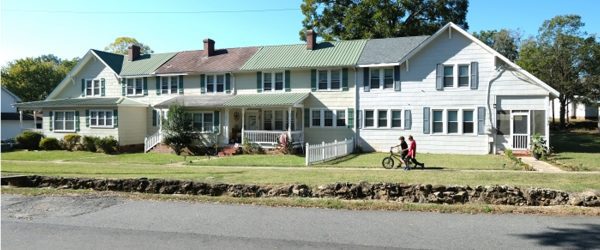Affordable housing: a shared crisis for urban, rural communities

Charlotte, one of the nation’s fastest-growing metropolitan areas, is struggling with housing affordability. Rising rents and home prices are the result of rapid growth and short supply.
Urban Institute researchers Christa Wagner Vinson, Bill McCoy and Katie Zager discovered that affordable housing also is a rural concern with areas experiencing severe housing shortages and issues with affordability, according to research conducted as part of the Carolinas Urban-Rural Connection project.
Cost-burdened households
A household that spends more than 30 percent of income on housing is cost-burdened, leaving less money available for building up savings or buying necessities like food or medicine. Urban and rural communities across the project region are nearly equal when it comes to the share of households that are cost-burdened.
Mecklenburg County, a decidedly urban county, is in the top quartile for the most households, according to the Urban Institute, using its well-being and cost-burdened index, which ranks counties on three variables: median household income, general poverty rate and children’s poverty rate.
Rural Richmond County, ranked in the fourth quartile, but has roughly the same percentage of households that are cost-burdened.
Where are renters and rental properties?
The housing crunch is related to options available. For example, in Montgomery County, a rural part of the region, 30 percent of the households rent, yet multi-family housing (apartments, townhomes, etc.) makes up less than 2 percent of the available stock. Across the region, 5 percent of the region’s stock is multifamily housing, yet renters compose an average of 28 percent of the population by county.
Small towns and rural communities seek to boost affordable housing
In Gastonia, construction is underway on an 80-unit affordable housing development with rents ranging from $600 to $800.
Work will begin next year in Kings Mountain on 228 affordable single-family homes for first-time buyers, after the city entered into a wastewater treatment agreement with the developer.
Mooresville town officials adopted a comprehensive housing policy in 2016 as a way to help homeowners remain in their homes. The town offers grants and low-interest loans for critical repairs.
According to Urban Institute researchers, local economic developers interviewed expressed the concern that to make the region more attractive to new employers, housing supply and affordability must be addressed.
Photo, by Nancy Pierce, Quadplexes built in Badin, North Carolina, for workers by Alcoa, which for generations was the town’s major employer. The aluminum works is gone now, leaving Badin to search for a new way forward.
 Since 1969, the UNC Charlotte Urban Institute has sought nonpartisan solutions to social, economic and environmental challenges facing communities in the Charlotte region through applied research and community outreach.
Since 1969, the UNC Charlotte Urban Institute has sought nonpartisan solutions to social, economic and environmental challenges facing communities in the Charlotte region through applied research and community outreach.
To mark its 50th year, the Urban Institute launches the Schul Forum Series on Nov. 21, which this year highlights findings from the Carolinas Urban-Rural Connections Project, a two-year research endeavor supported by the Duke Endowment aimed at identifying regional connections between urban and rural areas that can be strengthened to increase economic vitality.
As the inaugural forum approaches, Inside UNC Charlotte will share a preview of the project’s themes, outcomes and recommendations.